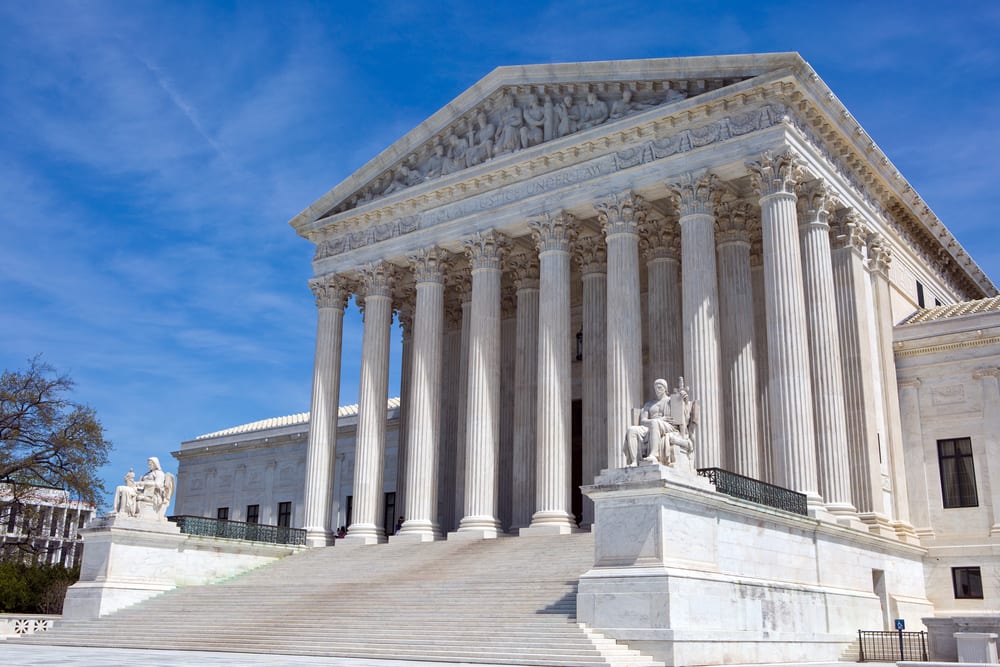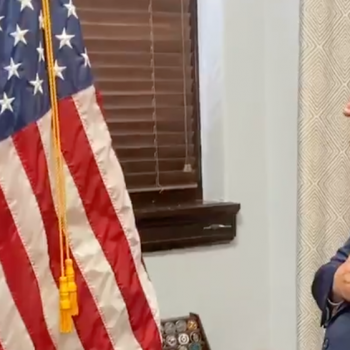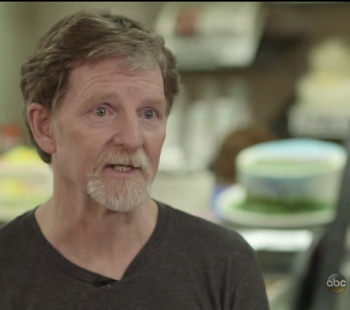The Supreme Court said unanimously today, in the case of Fulton v. City of Philadelphia, that Philadelphia can’t deny funding to a Catholic foster care agency just because it happens to be run by bigots. That’s bad news for anyone who thinks taxpayer funding shouldn’t be spent to support discriminatory groups.
The only good thing we can say about it is that it could’ve been much, much worse.

Here’s some backstory: In 2018, the city stopped funding a group called Catholic Social Services (CSS) because they refused to put children in the homes of same-sex couples. Was that a form of religious discrimination? The city said this was about breaking the rules; CSS signed a contract pledging not to discriminate but that’s precisely what they did. CSS countered by saying they would refer gay couples elsewhere, though that didn’t sit well with the city’s attorney:
CSS explains that it would be happy to refer same-sex couples to other agencies, and that there are 29 others operating in Philadelphia. In addition, CSS maintains that no gay couple has even approached CSS for foster care home placement, prompting [attorney Neal] Katyal to respond that “the National Baptist Association points out that if one of the agencies had a sign saying, ‘No Baptists allowed,’ it would be cold comfort to those folks who say, ‘Oh, you could just go somewhere else.'”
According to those who listened to the oral arguments, one of the main arguments revolved around whether a religious group should be permitted to discriminate against interracial couples in the same way. The Catholic group’s lawyer said no, because the government has an obligation to stop racial discrimination. But the liberal justices quickly asked why discrimination on the basis of sexual orientation would be okay using that same logic. Why did the Catholic group think racial bigotry was unacceptable but anti-gay bigotry was okay?
Katyal also pointed out that a ruling in favor of the Catholic group would allow religious groups to also discriminate against other religious groups. What would stop Catholics from saying they can’t place children with a Baptist or Muslim couple if they sincerely believed such religious views were bad for the child?
Those were fair questions.
Lower courts ruled in favor of the city, and they cited a 1990 Supreme Court decision (Employment Division v. Smith) that required laws that might infringe upon a religious belief to be neutral on the surface. In this case, they said, Philadelphia’s non-discrimination rules weren’t anti-Christian, so they were legal.
But the Supreme Court basically said that was the wrong framework. Writing for the majority, Chief Justice John Roberts said the city was violating the free exercise claims of the Catholic group:
The City’s actions burdened CSS’s religious exercise by forcing it either to curtail its mission or to certify same-sex couples as foster parents in violation of its religious beliefs.
What about the non-discrimination rules? Roberts said they weren’t “generally applicable” like the city claimed — because there were loopholes in the contract:
The non-discrimination requirement of the City’s standard foster care contract is not generally applicable. Section 3.21 of the contract requires an agency to provide services defined in the contract to prospective foster parents without regard to their sexual orientation. But section 3.21 also permits exceptions to this requirement at the “sole discretion” of the Commissioner. This inclusion of a mechanism for entirely discretionary exceptions renders the non-discrimination provision not generally applicable.
…
The question is not whether the City has a compelling interest in enforcing its non-discrimination policies generally, but whether it has such an interest in denying an exception to CSS. Under the circumstances here, the City does not have a compelling interest in refusing to contract with CSS. CSS seeks only an accommodation that will allow it to continue serving the children of Philadelphia in a manner consistent with its religious beliefs; it does not seek to impose those beliefs on anyone else. The refusal of Philadelphia to contract with CSS for the provision of foster care services unless the agency agrees to certify same-sex couples as foster parents cannot survive strict scrutiny and violates the Free Exercise Clause of the First Amendment.
If there’s any silver lining here, it’s that the ruling applies specifically to this case. Cities that have a non-discrimination clause in these types of contracts could still have them as long as they don’t step in legal minefields like the justices say Philadelphia did. Still, the ruling will now permit taxpayer dollars to fund faith-based discrimination in Philadelphia unless the contract changes.
Justice Amy Coney Barrett, in a separate concurrence, added that this decision (thankfully) does not overturn Smith. It doesn’t change Smith at all:
… I therefore see no reason to decide in this case whether Smith should be overruled, much less what should replace it.
Justice Samuel Alito, who ultimately agreed with the ruling, was downright furious this decision didn’t go further. His dissent is lengthy, full of footnotes, and appears to be the reason this case wasn’t officially decided until now:
This decision might as well be written on the dissolving paper sold in magic shops. The City has been adamant about pressuring CSS to give in, and if the City wants to get around today’s decision, it can simply eliminate the never-used exemption power. If it does that, then, voilà, today’s decision will vanish — and the parties will be back where they started.
…
Today’s decision will be of no help in other cases involving the exclusion of faith-based foster care and adoption agencies unless by some chance the relevant laws contain the same glitch as the Philadelphia contractual provision on which the majority’s decision hangs. The decision will be even less significant in all the other important religious liberty cases that are bubbling up.
…
After receiving more than 2,500 pages of briefing and after more than a half-year of post-argument cogitation, the Court has emitted a wisp of a decision that leaves religious liberty in a confused and vulnerable state. Those who count on this Court to stand up for the First Amendment have every right to be disappointed — as am I.
Justice Neil Gorsuch also said Alito’s fury was rightly placed:
Had we followed the path JUSTICE ALITO outlines — holding that the City’s rules cannot avoid strict scrutiny even if they qualify as neutral and generally applicable — this case would end today. Instead, the majority’s course guarantees that this litigation is only getting started. As the final arbiter of state law, the Pennsylvania Supreme Court can effectively overrule the majority’s reading of the Commonwealth’s public accommodations law. The City can revise its FPO to make even plainer still that its law does encompass foster services. Or with a flick of a pen, municipal lawyers may rewrite the City’s contract to close the §3.21 loophole. Once any of that happens, CSS will find itself back where it started.
You can expect church/state separation groups to weigh in with commentary very soon. I’ll update this post as they come in.
UPDATE:
The Center for Inquiry:
“Today the Supreme Court had a chance to say firmly and clearly that religious groups that receive public funding are not exempt from anti-discrimination law. They refused to do that,” said Nick Little, CFI’s vice president and legal director. “The only rights the Court values in today’s ruling are those of the religious group. The rights of children, the LGBTQ community, and the taxpayers at large were simply ignored.”
…
… “It is amazing how far this Court will blinker itself to clear and plain facts in order to privilege religious groups,” added Little. “To find this law discriminatory is naked preference for religion and is yet another indication of how the nonreligious cannot expect a fair hearing from this Court. The Court is performing mental gymnastics to find an absence of neutrality in order to avoid the fundamental impact of its ruling—that religious groups no longer have to obey civil rights laws.”
…
“The ruling makes it clear that the growing nonreligious population of the United States are second-class citizens in the eyes of this Court,” said [CFI’s president and CEO Robyn] Blumner. “Every legal privilege allowing religious groups to ignore the law the rest of us have to follow sends the message to the nation’s nonreligious citizens that their interest in a fair and just society will have to take a back seat.”
“With this decision, the Court has continued to chip away at the core principle that laws should apply to everyone, regardless of religion. Whenever conflicts arise, the outcome too often favors conservative Christian outcomes, even if it twists the law in knots or contradicts fundamental legal principles,” added [Vice President for Legal and Policy Alison] Gill. “The Supreme Court keeps creating new rules that conveniently allow certain religious interests to always win.”
“Today, the Supreme Court once again put the discriminatory beliefs of the few ahead of equality for all,” said Nick Fish, president of American Atheists. “Today’s decision reinforces the simple truth that Philadelphia taxpayers are being forced to subsidize discrimination. When my parents adopted me, the only thing that mattered was that they would love me and put my interests first.”
“While hundreds of thousands of young people wait for their forever homes in our nation’s foster care system, putting anything ahead of their best interests and denying them a loving family — whether they’re gay or straight, Catholic or Jewish, religious or not — is a moral disgrace,” added Fish.
Americans United for Separation of Church and State:
“Nine justices could agree on this decision because it was so narrow. The court concluded that because Philadelphia allowed individualized exemptions from its non-discrimination requirements in its foster care program, it had to exempt Catholic Social Services. Significantly, the court declined to rewrite the First Amendment to grant a broad license to discriminate in the name of religion. The court also acknowledged the importance of non-discrimination laws and specifically respected the dignity of LGBTQ people.
“We at Americans United will continue to work for real religious freedom, equality and the right to live and believe as we choose. The vast majority of Americans believe our laws should not allow anyone to use their religious beliefs to harm others — and certainly vulnerable children in foster care. Now more than ever, Congress needs to pass the Do No Harm Act to help prevent religious freedom from being misused to harm others.”
American Humanist Association:
“While the Supreme Court avoided overturning precedent that is vital to maintaining church-state separation, we are nonetheless stuck with a ruling, albeit narrow, that gives the Church a special privilege to discriminate against same-sex couples,” said Monica Miller, AHA’s Legal Director and Senior Counsel. “This ruling is yet another example of the Supreme Court setting aside the Rule of Law to benefit religion to the detriment of society.”
…
“While we breathe a sigh of relief that this ruling wasn’t the sledgehammer to the freedom from religion that we feared, we are deeply concerned, not only about the short-term impacts on children looking for a loving home, but also the long-term implications for the LGBTQ+ community as well as others impacted by religious discrimination,” noted Roy Speckhardt, Executive Director of the AHA.
Miller concluded: “The tragic part about today’s ruling is that its outcome was baked. We all knew the Court would give the Church a free pass to discriminate. We were simply waiting to see what kind of damage it would do to yield this outcome.”
The Freedom From Religion Foundation:
“It is distressing that a unanimous Supreme Court would seemingly bless the Catholic group’s brazen demand to be funded with tax dollars to carry out invidious discrimination,” says FFRF Co-President Annie Laurie Gaylor. “However, it is a relief to see that this narrow decision is likely to have a limited impact.”
…
“The Supreme Court’s narrow decision may allow nondiscrimination provisions to stand if governments do not provide for individual exceptions,” says FFRF Senior Counsel Patrick Elliott. “The city of Philadelphia may have a simple fix to this issue by deleting the exception language from its contracts.”
…
“Though today’s ruling was limited to the facts of this specific case, it still demonstrates an alarming trend among justices of the court in their willingness to expand privileges to Christians.” says FFRF Legal Director Rebecca Markert. “Under this ruling, Catholic Social Services is still eligible to participate in the foster care program certifications, and still allowed to discriminate against same-sex couples. We’re glad the decision wasn’t worse, but the LGBTQ community deserves better.”
(Image via Shutterstock)




It’s Moving Day for the Friendly ..."
It’s Moving Day for the Friendly ..."
It’s Moving Day for the Friendly ..."
It’s Moving Day for the Friendly ..."